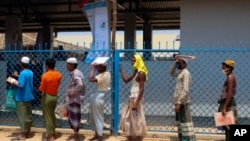Five years ago, Burmese security forces embarked on a campaign of violence, and ethnic cleansing against its population of the Muslim Rohingya ethnic group. Some attacks took place between October 2016 and January 2017. A second wave began in August 2017.More than a million Rohingya refugees have fled Burma.
Today, some 860,000 Rohingya refugees live in a camp in Cox’s Bazar, Bangladesh. Another 150,000 live in other countries in the region, including India, Thailand, Indonesia, and Malaysia. Around 600,000 Rohingya remain in Burma and face systemic discrimination there. Of these, over 130,000 are internally displaced people who have been confined to camps, mostly in Rakhine State.
On October 22, the United States co-hosted a virtual conference, “Sustaining International Support for the Rohingya Refugee Response,” to encourage other nations to give generously to the ongoing crisis and reaffirm U.S. support for Rohingya and Bangladesh by announcing nearly 200 million dollars in additional humanitarian aid through the end of Fiscal Year 2020, bringing the total U.S. contribution for this crisis response to nearly $1.2 billion since August 2017.
The conference highlights an international effort to resolve the crisis, said Deputy Secretary of State Stephen Biegun, who co-hosted the virtual conference along with senior officials from the United Kingdom, the European Union, and the United Nations High Commissioner for Refugees.
“It’s critical for us to address these vulnerable populations’ needs while redoubling our efforts to find a sustainable long-term solution to the crisis,” he said.
He highlighted the role of the Government of Burma in creating conditions conducive to the voluntary, safe, dignified, and sustainable return of Rohingya to Burma.
“As a first step, [Burma] must grant unhindered and sustained humanitarian access to affected communities – we will continue to be a partner with you in this effort,” said Deputy Secretary of State Biegun. Deputy Secretary Biegun also noted that more must be done to address the root causes of violence in Rakhine State, including by cooperating to end the trafficking of weapons and narcotics that have enabled the State’s violence and instability for far too long.
“As leaders, we are putting the spotlight on our international response to the plight of the Rohingya refugees in Bangladesh and elsewhere in the region, as well as those displaced internally in [Burma],” he said. “We will hold accountable those responsible for the horrific abuses that have occurred, and we will work with [the Rohingya community] to shape policies that reflect your community’s decisions about your future.”






